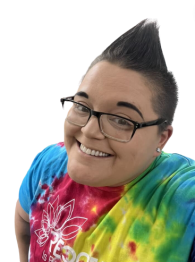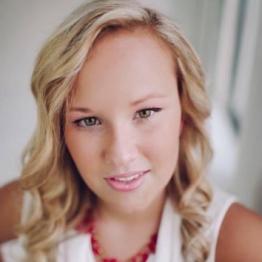OHIO Chillicothe helps support improved community health through Community Health Worker training
Vanessa Escamilla, Bayli Herzog and Jared Robertson come from different backgrounds, but they all share a strong desire to help serve their communities and solve cultural issues that can get in the way of successful health outcomes for the people they serve.
All three completed Community Health Worker (CHW) training at Ohio University Chillicothe this spring and are using the skills and knowledge they gained through that program in their work with social service agencies.

Serving: Escamilla works as a peer recovery supporter at Ross County Community Action and as a training facilitator for the Ohio Department of Mental Health & Addiction Services. She said she enjoyed learning how to take vital signs and learning about LGBTQ issues as part of the CHW training.
She will use the concepts she learned on topics such as nutrition, motivational interviewing, and trauma-informed care in her daily work supporting people dealing with mental health issues and substance use disorders. Not only has the CHW program helped Escamilla support those she serves through her job, but it has also helped her evaluate her own life and health.
“This program has actually made me take a good look at myself and my health,” she said. “It really was a great learning experience for me. The program opened my eyes to some things I want to improve in my life such as how I eat and care for my body.”

Solving: Herzog said the training taught her more about the role and how to leverage resources to support the people she serves in her job as a community health worker with CareSource in Dayton, Ohio.
“I have learned about resources available to us, how to use motivational interviewing, and how best to talk to my members,” Herzog said.
Robertson said the CHW training helped equip him with the skills needed to skillfully ask questions and gather information during difficult or uncomfortable conversations in his role as a victim advocate with Adena Health System.
“A CHW has many roles, and this training can help with those roles, Robertson said. “It (CHW training) can give you the basic knowledge and skills to help better your community. I chose this profession because I was a victim of a hate crime. The advocates I worked with showed me compassion and I genuinely felt as if they cared about my situation.”
Succeeding: As the director of community health and development for the Adena Health System, Kim Jones works with public health partners and other community partners to develop community health strategic plans.
“We do assessments every three years in the community, and we take that information and create a Community Health Improvement Plan that helps us figure out how we're going to tackle some of those priority health needs that we found in the assessment,” Jones said.
A Centers for Disease Control study shows that 80% of health outcomes are related to social factors, whereas only 20 percent of outcomes are related to clinical care. According to Jones, those social factors play a big role in Appalachian communities faced with limited resources, income disparities, and limited educational attainment.
“These are factors that really play into creating some pretty poor health outcomes,” Jones said.
She explained that even though Ross County ranks highly (5th in the state) for the quality of available healthcare, the county ranks 74th out of Ohio’s 88 counties for health outcomes. Although Ross County has top-quality health available, many people are unable to get to those resources, according to Jones.
Community Health Workers can play a critical role as navigators, connecting people with the appropriate care and resources.
“They help guide people to the resources that they need, advocate for them, and provide education and other supports,” said Jones. “The Community Health Worker role is so critical in connecting people to resources and the fact that Ohio University created this partnership with the Ohio Board of Nursing, so it could be credentialed, really excited me.”
Jones said the ideal community health worker is someone who likes people, is empathetic, and is accepting of diverse populations, ideas, beliefs, and lifestyles.
As part of the CHW training participants complete 130 hours in a field placement where they apply the skills and knowledge they are learning.
“When I go out and speak to supervisors and folks that handle the field placement, one of the key things that they bring up is how much it's enriched their ability to do case management with folks because they just focused a lot on the social pieces previously and weren't really incorporating the health dynamic into that care plan that they have for people,” Jones said. “Incorporating that (health) element really is enriching their ability to provide a good quality service to clients and see better positive outcomes in case management.”
Leveraging Partnerships and Responding to Community Needs
When OHIO Chillicothe launched a Community Health Worker (CHW) training program in 2022 in collaboration with Ohio University's OHIO Alliance for Population Health in the College of Health Sciences and Professions, and the Voinovich School of Leadership and Public Service, Jones was eager to get involved and now teaches CHW classes at OHIO Chillicothe. Jones is currently teaching a group of 16 people representing 6 different counties.
Since 2017 Ohio University has trained over 250 Community Health Workers who serve their communities every day and help make Ohioans healthier, stronger, and more connected to health and social service resources.
CHW training began on the Chillicothe campus in response to community input gathered through surveys, listening events and conversations with community partners who saw a great need for such expertise.
The CHW Training Program consists of 100 hours of classroom and didactic content, including homework and group assignments. Once participants successfully complete the 100 hours, they complete 130 hours in a community setting, where they practice skills and develop knowledge about community resources. Participants are eligible for certification through the Ohio Board of Nursing once they have successfully completed both components.
For more information on the Community Health Work program, visit ohio.edu/chsp/alliance/community-health-workers.
